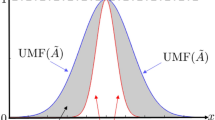Abstract
This paper addresses the criterion of the robust controller design for the solution of a number of fuzzy C-means clustering algorithms, which are robust to plant parameter disturbances and controller gain variations. The control and stability problems in the present nonlinear systems are studied based on a Takagi–Sugeno (T–S) fuzzy model. A lately and important proposed integral inequality is considered and selected according to the method of the free weight matrix, with these comparatively flexible stability criteria which are determined in the numerical form of linear matrix inequalities (LMIs). Under the condition of the premise in which the controller and the control system partake the same rules, the method does not inquire the same number of membership functions and mathematical rules. In addition, the improved control is used for large-scale nonlinear systems, where the stability criterion of the closed T–S fuzzy system is obtained through LMI and rearranged through the membership function for machine learning . The close-loop controller criteria are derived by using the Lyapunov energy functions to guarantee the stability of the system . Eventually, an instance is presented to reveal the efficacy of evolution.







Similar content being viewed by others
Change history
21 December 2023
This article has been retracted. Please see the Retraction Notice for more detail: https://doi.org/10.1007/s00500-023-09588-6
References
An J, Li T, Wen G et al (2012) New stability conditions for uncertain TS fuzzy systems with interval time-varying delay. Int J Control Autom Syst 10(3):490–497
Arqub OA (2017) Adaptation of reproducing kernel algorithm for solving fuzzy Fredholm–Volterra integrodifferential equations. Neural Comput Appl 28:1591–1610
Arqub OA, Al-Smadi M (2020) Fuzzy conformable fractional differential equations: novel extended approach and new numerical solutions. Soft Comput 2020:1–22
Arqub OA, Al-Smadi M, Momani S, Hayat T (2017) Application of reproducing kernel algorithm for solving second-order, two-point fuzzy boundary value problems. Soft Comput 21:7191–7206
Boren L (2016) Memory feedback control of uncertain stochastic time-varying delay systems. Control Eng 9:1462–1468
Chen CW (2014a) A criterion of robustness intelligent nonlinear control for multiple time-delay systems based on fuzzy Lyapunov methods. Nonlinear Dyn 76(1):23–31
Chen CW (2014b) Interconnected TS fuzzy technique for nonlinear time-delay structural systems. Nonlinear Dyn 76(1):13–22
Chen T (2021) Optimized AI controller for reinforced concrete frame structures under earthquake excitation. Adv Concr Constr. https://doi.org/10.12989/acc.2021.11.1.000
Chen T, Chen JCY (2019) Decentralized fuzzy Cmeans robust algorithm for continuous systems. Aircr Eng Aerosp Technol 92:222–228
Chen J, Xu S, Zhang B (2016) Single/multiple integral inequalities with applications to stability analysis of time-delay systems. IEEE Trans Autom Control 99:1
Chen T, Khurram S, Cheng CYJ (2019) A relaxed structural mechanics and fuzzy control for fluid–structure dynamic analysis. Eng Comput. https://doi.org/10.1108/EC-11-2018-0522
Hsiao F-H, Hwang J-D (2002) Stability analysis of fuzzy large-scale systems . IEEE Trans Syst Man Cybern Part B (Cybern) 32:122–126
Kang W, Zhong S, Shi K et al (2016) Finite-time stability for discrete-time systems with time-varying delay and nonlinear perturbations. ISA Trans 60:67–73
Kwon OM, Park MJ, Park JH et al (2016) Stability and stabilization of T–S fuzzy systems with time-varying delays via augmented Lyapunov–Krasovskii functionals. Inf Sci 372:1–15
Lam HK, Leung FHF (2011) Stability analysis of fuzzy-model based control systems. Springer, Berlin
Lian Z, He Y, Zhang CK et al (2016) Stability analysis for TS fuzzy systems with time-varying delay via free-matrix-based integral inequality. Int J Control Autom Syst 14(1):21–28
Liu F, Wu M, He Y et al (2010) New delay-dependent stability criteria for TS fuzzy systems with time-varying delay. Fuzzy Sets Syst 161(15):2033–2042
Runmin C, Yufu J (2016) Stability criterion for a class of T–S fuzzy time-delay systems. J Hangzhou Dianzi Univ Nat Sci Ed 36(5):52–56
Thathachar MAL, Viswanath P (1997) On the stability of fuzzy systems. IEEE Trans Fuzzy Syst 5:145–151
Wang Z, Ding S, Shan Q et al (2016) Stability of recurrent neural networks with time-varying delay via terminal method. IEEE Trans Neural Netw Learn Syst 99:1–8
Zhang Z, Gao XZ, Zenger K et al (2013) Delay-dependent stability analysis of blurred fuzzy systems with state and Input delays under imperfect premise matching. Math Probl Eng 2013:301–302
Zhao Y, Gao H, Lam J et al (2009) Stability and stabilization of delayed T–S fuzzy systems: a delay partitioning approach. IEEE Trans Fuzzy Syst 17(4):750762
Author information
Authors and Affiliations
Contributions
Dr. TC wrote the main manuscript text, Dr. DK developed the algorithm and Dr. CYJC prepared and demonstrated the methodology.
Corresponding author
Ethics declarations
Conflict of interest
The author declares that there is not any conflict of interest regarding the process of publication of this article. All the analyzed material during the present study are included in this paper.
Additional information
Publisher's Note
Springer Nature remains neutral with regard to jurisdictional claims in published maps and institutional affiliations.
This article has been retracted. Please see the retraction notice for more detail: https://doi.org/10.1007/s00500-023-09588-6"
Rights and permissions
Springer Nature or its licensor (e.g. a society or other partner) holds exclusive rights to this article under a publishing agreement with the author(s) or other rightsholder(s); author self-archiving of the accepted manuscript version of this article is solely governed by the terms of such publishing agreement and applicable law.
About this article
Cite this article
Chen, T., Kuo, D. & Chen, C.Y.J. RETRACTED ARTICLE: Fuzzy C-means robust algorithm for nonlinear systems. Soft Comput 25, 7297–7305 (2021). https://doi.org/10.1007/s00500-021-05655-y
Accepted:
Published:
Issue Date:
DOI: https://doi.org/10.1007/s00500-021-05655-y




